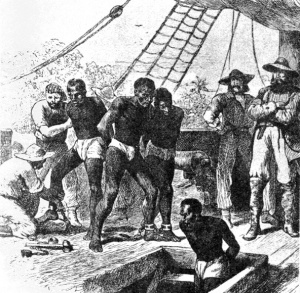
In my series on Reclaiming African History, I came across this article by Ama Biney on Pambazuka about reparations for slavery, which I found very pertinent. I decided to share parts of it. I particularly liked the ending paragraph, “… in addressing the issue of reparations, we must also address transforming the system of capitalism which slavery gave birth to. A rupture with this unequal and exploitative system is fundamental in eliminating oppression that remains with us in the twenty-first century in reconfigured forms“. For the full article, go to Pambazuka.
=============
… what should reparations entail?

… Acknowledging the atrocity and enormity of this experience is necessary in an official apology. Commentators have observed how the Maoris received an apology from the British Queen in 1995. [2] In 2008 the Australian Prime Minister Kevin Rudd apologized in parliament to all Aborigines for laws and policies that “inflicted profound grief, suffering and loss”. [3] It appears when it comes to Africans our lives, bodies and history do not matter. Racism will find various rationalizations (or excuses) to deny that enslavement of Africans merits an apology and reparations. Yet, we cannot erase the collective historical memory and experiences of enslavement that was wrought on people of African descent and continues with the covert and overt forms of racial discrimination that they still experience in the 21st century. …

Whilst it is the case that no amount of financial compensation can address the psychological and emotional scars of enslavement of people of African descent, nor the horrors of the Middle Passage, nor those who remain buried in the Atlantic Ocean as a consequence of suicide, nor the 132 Africans deliberately thrown overboard in 1786 on the slave ship Zong — in order that the ship owners could claim the insurance — a comprehensive economic package needs to address the fact that the current economic and technological underdevelopment of Africa and the Caribbean is symptomatic of the impact of 400 years of enslavement. This enslavement was followed by the brief but no less damaging interlude of colonialism and must be recognized as central to any form of reparations.
… There are those who refuse to accept the fact that the economic wealth of Europe was built on the sweat, blood and toil of African people to the detriment of Africa. Yet, let us be clear that the trans-Atlantic slave trade was not a “trade.” The meaning of “trade” supposes equal benefit to both parties. It was not “trade” but the looting of Africa in which Europe benefited at the expense of Africa as Walter Rodney graphically illustrates in his acclaimed book, “How Europe Underdeveloped Africa.” The consequence for Africa was and remains that “the African economy taken as a whole was diverted away from its previous line of development and became distorted.” [4]

Reparations is therefore a quest to repair the economic damage of underdevelopment wrought by the process of enslavement and colonialism. This economic redress will be symbolic for it may run into trillions of dollars, for one can never place an economic value on the millions of Africans whose lives were lost in the slave raids, or as they died in the long march to the forts on the coast. How many died on such journeys? Can we account for those enslaved women who secretly aborted or killed their child to prevent them from experiencing slavery? And should we not include the medical experimentations carried out on the bodies of enslaved African women graphically documented in the books From Midwives to Medicine and Medical Apartheid? [5]
… Also, it is important for us to remember that on the ending of slavery in the British colonies, the British government were able to compensate the slave owners £20 million (£20 billion in today’s money). There was no compensation for the former enslaved African men and women. In the USA there were pledges to the freed men and women of “forty acres and a mule” that never materialized across the board. [6]
… What should reparations for slavery entail? It should address the following:
First, an apology to all continental Africans and people of African descent for the immorality of slavery, for merely stating “regret” — as the former British Prime Minister Tony Blair did in 2007 — is mere cant. [7] …

Second, we must demand that all Western governments instruct Western museums and citizens to hand over to African countries illicitly acquired African artifacts languishing both publicly and privately in their hidden vaults. They must also provide the training and facilities for African countries to host, display and conserve these returned items. This includes thousands of artifacts, among them being the more famous and well known 400 Ethiopian treasures looted by British soldiers during the 1868 Magdala expedition. [9] There are also the Benin bronzes looted in the British invasion of the Nigerian kingdom of Benin in 1896. [10] …
Third, as mentioned above, the brain drain of African and African Caribbean professionals should be halted by offering these professionals the same salaries to voluntarily return to Africa and the Caribbean in order to assist in the building of new schools, universities, hospitals and clinics that would be set up and financed by a comprehensive reparations economic program.
Debt cancellation would free up these critical funds to address the real needs of African citizens.
 Fourth, cancellation of all debt incurred by the Caribbean and African nations on the grounds that they are odious and were not incurred by the ordinary citizens of Africa and the Caribbean but rather their ruling classes. … In short, aid is simply a paltry and ineffective band aid that keeps African economies in a continued process of economic subordination to neoliberal capitalism under the illusion that there will be “trickle down growth.” …
Fourth, cancellation of all debt incurred by the Caribbean and African nations on the grounds that they are odious and were not incurred by the ordinary citizens of Africa and the Caribbean but rather their ruling classes. … In short, aid is simply a paltry and ineffective band aid that keeps African economies in a continued process of economic subordination to neoliberal capitalism under the illusion that there will be “trickle down growth.” …
… Ultimately, in addressing the issue of reparations, we must also address transforming the system of capitalism which slavery gave birth to. A rupture with this unequal and exploitative system is fundamental in eliminating oppression that remains with us in the twenty-first century in reconfigured forms.


I think I agree with all of this, Dr Y. There’s also a horrible irony in all this. The rich world certainly grew richer on the back of slavery, but now its citizens are poisoning themselves to death with one of the key products that so many millions were enslaved for – sugar. Dealers in this product have also been doing a good job of feeding it back in quantity to the less developed world in the form of high sugar sodas. Then there’s the environmental cost of sugar production in poor countries. What an unholy mess capitalism has made of the world and its peoples.
LikeLike
You said it so well Tish!
LikeLiked by 1 person
Thank you Dr Y 🙂
LikeLike
Reparations is way past due!
Great post, Dr. Y!
LikeLike
Reblogged this on The Militant Negro™.
LikeLike
Thanks for reblogging Mr. Militant Negro. Have a great day!
LikeLike
Great article, enjoy your HuMpDaY
LikeLike
Thank you for stopping often my blog.
LikeLike
I want reparation for all of the white man’s guilt heaped upon me
even though nobody in my ancestry ever owned slaves and my
earliest ancestor was a leader in the Union Army, Why should I
pay for mistakes that even my ancestors did not make?
Also, I have it on good authority that when African tribes conquered
another tribe they were taken as slaves long before white europeans
landed and started loading slaves on ships.
Is it true that a good portion of slaves put onto ships had actually
been rounded up by African tribes profiting from this trade?
In the USA there were even some free blacks who owned slaves,
Who pays THEIR portion of reparations?
How would you arrange for their decendants to pay reparations
rather than receive them merely because they are black?
What if a person was 33% black slave owner ancestry,
33% slave ancestry, 20% White and 13% Lakota Sioux?
Should their slave holder part pay their enslaved part and
what about the minority white and Sioux parts?
How would you select out payors and payees without that
becoming racial oppression all over again?
LikeLike